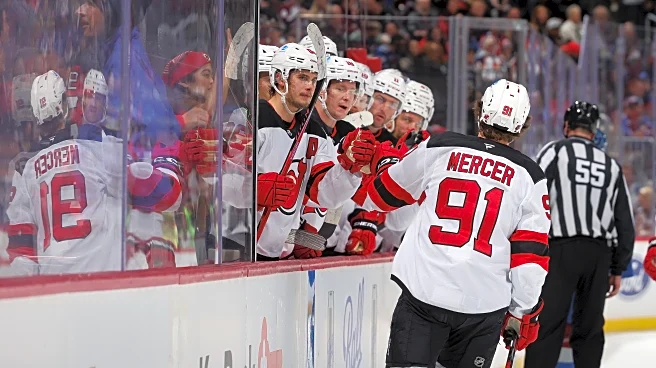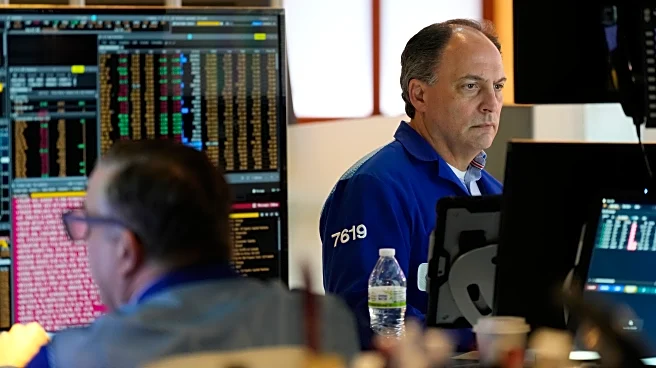Over the past two seasons, Dawson Mercer has not been able to reach the heights of his breakout 2022-23 campaign. That season, he posted 27 goals and 56 points, all while dominating the run of play on a line
with Nico Hischier and Tomas Tatar for much of the season. It was an excellent sophomore campaign, and we all expected Mercer to continue improving in the years to come.
That, unfortunately, is not how it worked out. Mercer posted 33 points in 2023-24, and 36 points last season. He did score 20 and 19 goals in those years respectively, which is reasonable, but the fact that he could not even reach half a point per game was massively disappointing for a young player with so much potential. On top of that, his underlying numbers either stagnated or outright regressed. It wasn’t looking good for Mercer as far as developing into a true impact player.
But Mercer has indeed blossomed into an impact player to begin this season. He’s right around a point per game pace, which is a huge upswing in production. In fact, he’s second on the team in goals behind only Jack Hughes, which is a very pleasant surprise. He’s contributing on both special teams units, he’s helping shut down top competition, and he’s closing out games when the Devils are protecting a late lead. 2025-26 has been a very promising turnaround for Mercer.
So the next question is: How real is this? Is this early season success sustainable, or is this a flash in the pan? That’s what we’ll try to find out today. Let’s take a little deeper dive into Dawson Mercer’s season thus far. We will try and find out what seems real, what seems like a mirage, and what we can expect moving forward.
Note: All stats below are through November 2nd, meaning they do NOT include any stats from the Devils’ game late last night against the Anaheim Ducks.
Point Production
This is the simplest part of Mercer’s game to analyze, so let’s start here.
Through the first four seasons of his career, Mercer averaged approximately 42 points per season. As mentioned above though, that number is carried a little bit by his 56-point 2022-23. Take that away, and it’s closer to the mid-30’s. Not nothing, but far from an impact player.
This season has been a complete turnaround. Mercer has eight goals and 13 points in 12 games. For Mercer to be averaging more than a point per game is pretty surprising considering his track record. What’s not a surprise is his goal to assist ratio. Over the last two seasons, Mercer finished with more goals than assists. Meanwhile he only collected two more assists than goals in 2022-23, and his rookie season saw him post 17 goals and 25 assists. That rookie year was his most “normal” looking season, and it still came reasonably close to being a 1:1 goal to assist ratio.
Mercer has always been much more of a scorer than a playmaker, so seeing him with eight goals and five assists should not be a surprise. No, the real surprise is just how much Mercer is lighting the lamp. Eight goals in 12 games is fantastic work. It’s hard to believe he keeps up a roughly 55-goal pace, but perhaps Mercer really has found another level.
The Funny Thing About His Goals
So just taking a look at Mercer’s total goal number would lead you to believe he’s developed into a bonafide sniper. But here’s an interesting little quirk about Mercer’s eight goals so far:
Only one of them have come at 5-on-5.
That lone 5-on-5 tally came on October 28 at Colorado. Aside from that, Mercer has scored three power play goals, one traditional shorthanded goal, two traditional empty-net goals, and one shorthanded empty-net goal. Four of his five assists have come at 5-on-5 though, so at least he’s registering helpers at even strength.
They all count the same in the end, but I do think it would be nice if Mercer could start producing at 5-on-5 as well considering that is by far the most common game state in hockey. If he continues to be lethal on both special teams units, then 5-on-5 production doesn’t matter as much. But it’s hard to assume Mercer can sustain his level of production on special teams, especially on the penalty kill. He clearly has a nose for the net and a goal-scorer’s mentality. But thus far, that has not translated to 5-on-5 play.
The Elephant In The Room
The other thing that clearly cannot be ignored about Dawson Mercer’s hot start is the fact that he is shooting at a remarkable 34.8% clip. That, quite simply, is unsustainable. Not even the greatest scorers in the game reach that level of shooting success. The highest shooting% Steven Stamkos has registered in a full season is 19.8%. For Alex Ovechkin, it’s 18.6%. For Auston Matthews, it’s 18.7%. Sam Reinhart posted a 24.5 shooting% in 2023-24, and that was looked at as fluky and unsustainable at the time. I think you get the picture: Mercer will absolutely not convert on just over one-third of his shots this season.
Through his first four seasons, Mercer has averaged a 14.1 shooting%, just in case you still had hopes that maybe I’m wrong and his newfound shooting prowess is sustainable. Mercer is shooting a tiny bit more this season, which is nice. He averaged 147.5 shots on goal through his first four seasons, and he has 23 shots in 12 contests this season, a pace of about 157 over a full campaign. Let’s say his shots on goal pace remains the same, but he converts at his career average from his first four seasons: 14.1%. That would mean that if Mercer plays a full 82-game slate again, over the last 70 games of his season, Mercer will score about 19 more goals. Add the eight tallies he’s already banked, and we’re looking at a roughly 27-goal season from Mercer, which would match his career high.
Obviously there’s a lot of speculation involved in those projections, but I don’t think any individual piece of speculation listed above is outlandish in any way. It’s fair to assume Mercer will come back down to earth, but also fair to expect him to still put up strong scoring numbers given what we’ve seen from him so far.
Under The Hood
So that takes care of Mercer’s traditional counting stats. Now let’s take a look at his underlying metrics from a few different sources.
We’ll start with Natural Stat Trick, which might just be the more prominent public analytics model in North American hockey. Given how good Mercer has looked and how many points he’s collected over his first 12 games, you’d think his advanced numbers would look great. Unfortunately that is not actually the case (all numbers 5-on-5):
Corsi For%: 49.69%
Scoring Chances For%: 46.97%
High Danger Corsi For%: 50.00%
Expected Goals For%: 48.77%
His CF% and HDCF% are reasonable, but he’s not looking so hot in SCF% and xGF%. I will admit, this does not seem quite right to me. Based on the eye test, Mercer might not be absolutely dominating the run of play early this season, but I have felt as though New Jersey has been the better team when he’s on the ice. So to see him below breakeven in three categories and exactly breakeven in the last one doesn’t square.
Fortunately for both myself and anyone else who thinks Mercer is playing better than those numbers would indicate, other analytics models seem to agree. Over at Hockey Stat Cards, Mercer is currently tabbed at a +2.6 Overall Net Rating. For context, that is the single highest rating on the team, higher than even Jack Hughes, Nico Hischier, and Jesper Bratt. Breaking it down further, Mercer currently has a +1.5 Offensive rating, which puts him in the 93rd percentile league-wide, a stellar distinction. He’s also killing it defensively too, as his +1.1 Defensive Rating places him in roughly the 88th percentile. His Overall Rating of +2.6 has him in the 96th percentile, showing that at least by the Game Score model, Mercer has been one of the absolute best players in the NHL through 12 games.
Meanwhile, a look at Moneypuck shows that Mercer has at the very least contributed to a terrific top line in New Jersey. In about 87 minutes at 5-on-5 together, Mercer’s line with Hischier and Meier have posted a 59.5 xGF%. Among lines with at least 80 minutes played together, that is the seventh-best xGF% in the league. Obviously Hischier and Meier do a lot of the heavy lifting on that line, but Mercer’s contributions cannot be discounted. He is a big part of why that line has thrived.
And while we’re talking about that trio, it is important to keep in mind the absolutely brutal competition they are fed on a nightly basis. Head coach Sheldon Keefe uses them as the matchup line on other teams’ top players every game, so the fact that the Meier-Hischier-Mercer line controls play AND puts up points is terrific. Going back to Hockey Stat Cards for a second, they also have a metric that measures the quality of competition a player faces. In Mercer’s case, his Offensive QoC and Defensive QoC are in the 94th and 93rd percentile respectively. We all knew Mercer and his line face really tough competition, but if you were wondering how tough his deployment is compared to everyone else in the league, there’s your answer: Mercer has tougher matchups than roughly 94% of the rest of the NHL.
Final Thoughts And Your Take
So at the end of the day, what are we to make of Dawson Mercer’s hot start to the season? To me, there are a few takeaways.
Number one, I think we can expect his goal-scoring numbers to really slow down. His shooting% is way out of whack, and he’s been getting some good puck luck on special teams. He should start burying pucks at 5-on-5 soon, but he won’t stay on a 50-plus goal pace for long.
Number two, While Natural Stat Trick doesn’t seem overly impressed with Mercer’s game thus far, other analytics metrics do. I do believe in NST’s model, but they are not perfect, and I think in this case their numbers underrate Mercer’s performance through 12 contests. I take comfort in the fact that multiple other analytics models think Mercer is doing well so far.
Number three, aside from when Mercer moonlights as the third-line center as he’s done in a few games due to injuries, I expect him to continue to eat brutal minutes on Nico Hischier’s wing. That will harm his point production, but if he can help shut down elite competition, a handful fewer goals and assists is a price worth paying. Especially if he can still contribute reasonably well on special teams once his shooting% bender ends.
So while I do not expect Mercer to produce at a point per game pace this season, I expect him to post a respectable amount of points, probably his most since his banner 2022-23 campaign. And I also expect him to continue to drive play well in the face of difficult matchups, which is an immensely valuable thing to contribute.
What do you make of Dawson Mercer’s season thus far? Do you agree that his goal-scoring should slow down soon? Do you agree that even without point production, what he’s done against top competition makes him very valuable? Overall, what do you expect out of him the rest of the way? As always, thanks for reading!










